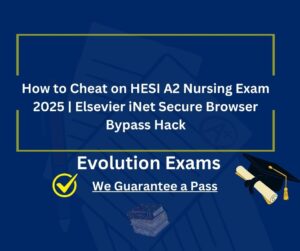Best Ways to Cheat on Online Proctored Exams in 2025
Best Ways to Cheat on Online Proctored Exams in 2025
Online proctored exams have become the norm in education and certification, but students are always looking for ways to bypass the system. While cheating might seem tempting—especially when stress and pressure are high—it’s important to understand the risks, consequences, and evolving anti-cheating technologies.
In this post, we’ll explore the latest cheating methods students use in 2025, how proctoring systems detect them, and why academic integrity matters more than ever.
Can You Still Cheat on Online Proctored Exams in 2025?
The short answer? It’s harder than ever. With AI-powered proctoring, blockchain-secured records, and multi-camera surveillance, cheating is becoming increasingly difficult—but not impossible .
However, before diving into the “how,” consider this:
- Cheating erodes trust—your degree or certification loses value if employers suspect fraud.
- Getting caught has serious consequences, including expulsion, revoked certifications, and permanent academic records.
- New AI proctoring tools (like facial recognition, keystroke analysis, and voice detection) make cheating riskier than ever .
That said, let’s look at the most common cheating methods in 2025—and how institutions are fighting back.
Top 7 Ways Students Cheat on Online Proctored Exams (And How They Get Caught)
1. Impersonation (Proxy Testing)
One of the oldest tricks—hiring someone else to take your exam—is still around, but AI makes it much harder.
- How it works: Students share login details or use deepfake tech to bypass facial recognition.
- Detection: Advanced biometrics (typing patterns, voice matching, and live ID verification) flag inconsistencies .
- Solution: Some proctoring services now require real-time authentication checks mid-exam to prevent last-minute swaps .
2. Virtual Machines & Hidden OS
Tech-savvy students use virtual machines (VMs) to run a second operating system undetected while searching for answers.
- How it works: The proctoring software monitors the main OS, while a hidden VM accesses study materials.
- Detection: AI now scans for unusual system processes, RAM usage spikes, and VM signatures .
- Solution: Secure exam browsers (like PEBble) block unauthorized software, including VMs .
3. Screen Sharing & Remote Help
Students use apps like Zoom, TeamViewer, or Discord to share their screen with a helper.
- How it works: A friend watches the exam and feeds answers via chat or voice call.
- Detection: Proctoring AI flags unusual eye movements, background voices, or multiple cursor movements .
- Solution: Lockdown browsers disable screen sharing, and two-camera setups eliminate blind spots .
4. Smart Devices & Wearables
Smartwatches, wireless earbuds, and phones are still popular cheating tools.
- How it works: Students hide phones under desks or use smartwatches to receive answers.
- Detection: AI scans for suspicious movements (e.g., looking down frequently) and detects Bluetooth signals .
- Solution: Some proctors now require 360-degree room scans before exams .
5. Bathroom Break Exploits
A classic move—students fake connectivity issues or bathroom breaks to check notes.
- How it works: They leave the camera view to access hidden materials.
- Detection: AI tracks absence time and flags unusual pauses .
- Solution: Strict no-break policies or monitored pauses are becoming standard .
6. Hacking Exam Software
Some students manipulate browser extensions or use coding to reveal correct answers.
- How it works: Exploiting vulnerabilities in the exam platform to decode answers.
- Detection: Proctoring systems now log every action in tamper-proof blockchain records .
- Solution: Secure browsers prevent extensions and monitor code injections .
7. ChatGPT & AI Cheating
Generative AI tools like ChatGPT can write essays or solve problems in real time.
- How it works: Students copy-paste exam questions into AI chatbots.
- Detection: Proctoring tools now track unnatural typing patterns and flag AI-generated responses .
- Solution: Some platforms block AI websites during exams .
You may also like // The Best Methods to Bypass Respondus LockDown Browser
Final Verdict: Can You Cheat in 2025?
Technically, yes—but the odds are against you. With AI proctoring, blockchain logs, and multi-layered authentication, cheating is a high-risk gamble.
Instead of looking for shortcuts, focus on learning the material. In the long run, integrity pays off far more than a temporary exam boost.
What’s your take? Have you encountered these anti-cheating measures? Share your thoughts below!



